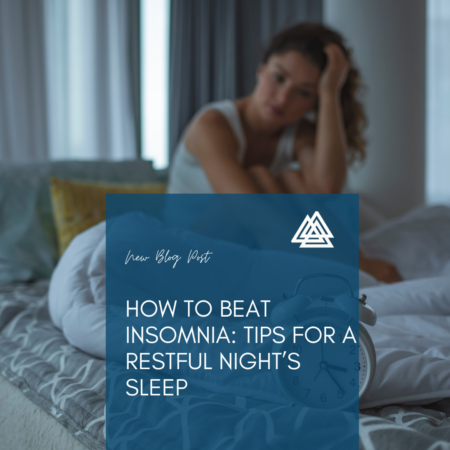 Insomnia is a common sleep disorder that affects millions of people worldwide. Characterized by difficulty falling asleep, staying asleep, or waking up too early, insomnia can significantly impact your quality of life, leading to fatigue, irritability, and difficulties with concentration. Fortunately, there are several strategies to help you overcome insomnia and achieve a restful night’s sleep. In this blog post, we’ll explore effective techniques and lifestyle changes that can help you beat insomnia and promote better sleep health.
Insomnia is a common sleep disorder that affects millions of people worldwide. Characterized by difficulty falling asleep, staying asleep, or waking up too early, insomnia can significantly impact your quality of life, leading to fatigue, irritability, and difficulties with concentration. Fortunately, there are several strategies to help you overcome insomnia and achieve a restful night’s sleep. In this blog post, we’ll explore effective techniques and lifestyle changes that can help you beat insomnia and promote better sleep health.
1. Establish a Consistent Sleep Schedule
One of the most effective ways to improve your sleep quality is to establish a regular sleep schedule. Going to bed and waking up at the same time every day helps regulate your body’s internal clock, making it easier to fall asleep and wake up feeling refreshed. Here’s how to create a consistent sleep schedule:
- Set a Fixed Bedtime: Choose a bedtime that allows for 7-9 hours of sleep and stick to it, even on weekends.
- Create a Relaxing Pre-Sleep Routine: Engage in calming activities before bed, such as reading, taking a warm bath, or practicing relaxation exercises. This helps signal to your body that it’s time to wind down.
2. Create a Sleep-Inducing Environment
Your sleep environment plays a crucial role in your ability to fall asleep and stay asleep. Making a few adjustments can significantly enhance your sleep quality:
- Limit Noise and Light: Use blackout curtains to block out light and consider white noise machines or earplugs to minimize disruptive sounds.
- Optimize Temperature: Keep your bedroom cool, ideally between 60-67°F (15-19°C), as a lower temperature is conducive to sleep.
- Invest in Comfortable Bedding: Ensure your mattress and pillows are supportive and comfortable. A good quality mattress can make a significant difference in sleep quality.
3. Limit Screen Time Before Bed
The blue light emitted by smartphones, tablets, and computers can interfere with your ability to fall asleep. Blue light can disrupt the production of melatonin, the hormone that regulates sleep. To promote better sleep:
- Set a Screen Curfew: Aim to turn off all electronic devices at least 30-60 minutes before bedtime.
- Use Blue Light Filters: If you must use screens in the evening, consider using blue light blocking glasses or enable the night mode feature on your devices.
4. Watch Your Diet and Caffeine Intake
What you consume can significantly affect your sleep patterns. Here are some dietary tips to consider:
- Limit Caffeine and Nicotine: Both caffeine and nicotine are stimulants that can interfere with sleep. Try to avoid them in the afternoon and evening.
- Avoid Heavy Meals Before Bed: Eating large or spicy meals too close to bedtime can cause discomfort and disrupt your sleep. Aim to finish eating at least 2-3 hours before going to bed.
- Consider Sleep-Promoting Foods: Incorporate foods rich in tryptophan, magnesium, and melatonin into your diet, such as turkey, nuts, seeds, and cherries.
5. Incorporate Relaxation Techniques
Managing stress and anxiety is essential for combating insomnia. Incorporating relaxation techniques into your daily routine can help you unwind and prepare for sleep:
- Practice Mindfulness and Meditation: Mindfulness practices can help calm your mind and reduce anxiety. Consider using guided meditation apps or practicing deep breathing exercises.
- Try Progressive Muscle Relaxation: This technique involves tensing and relaxing different muscle groups in your body, promoting physical relaxation and reducing tension.
- Engage in Gentle Yoga or Stretching: Gentle yoga or stretching before bed can help release tension in your muscles and prepare your body for sleep.
6. Limit Naps During the Day
While short naps can be refreshing, long or irregular napping during the day can negatively impact nighttime sleep. If you must nap:
- Keep Naps Short: Limit naps to 20-30 minutes to avoid disrupting your nighttime sleep schedule.
- Time Your Naps Wisely: Try to nap earlier in the day rather than in the late afternoon or evening.
7. Seek Professional Help When Needed
If you’ve tried these strategies and still struggle with insomnia, it may be time to consult a healthcare professional. Persistent insomnia can be a sign of an underlying health issue or sleep disorder that requires further evaluation. Your healthcare provider can help identify the root cause and recommend appropriate treatments, which may include cognitive-behavioral therapy for insomnia (CBT-I) or medication.
Conclusion
Beating insomnia requires a multifaceted approach that combines lifestyle changes, sleep hygiene practices, and relaxation techniques. By establishing a consistent sleep schedule, creating a conducive sleep environment, managing your diet, and incorporating relaxation methods, you can significantly improve your sleep quality. Remember that everyone is different, so it may take some time to find the right combination of strategies that work for you. If your insomnia persists, don’t hesitate to seek professional guidance to help you regain control of your sleep and overall well-being. Sweet dreams!
